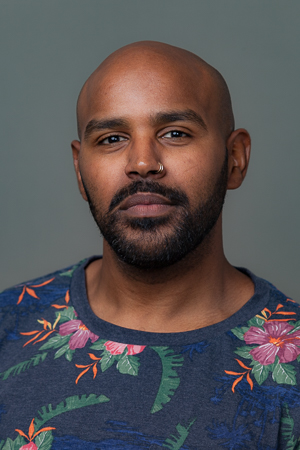Faculty Profile
Amaury Leopoldo Sosa
Assistant Professor of Spanish and Portuguese (2017)Contact Information
Bosler Hall
--
Bio
I was born in Santo Domingo, Dominican Republic, and have lived and studied in New York, Vermont, Rio de Janeiro, and Madrid. These crossings inform and drive my comparative and cross-disciplinary approach to teaching and research questions about the cultural productions of Iberia, Latin America, and the Latinx diaspora. In my classes, we engage close reading strategies and queer and feminist methodologies to unpack literary and audiovisual texts. As for scholarship, I focus on early modern life writing, difference and identity, subjectivity, vigilance, and the Inquisition. I am currently working on a project tentatively titled, “The Auto/Biographical Imperative," which examines 16th- and 17th-century I/Eye-texts, surveillance, and empire.
Education
- B.A., Middlebury College, 2007
- Ph.D., New York University, 2018
2025-2026 Academic Year
Fall 2025
SPAN 201 Intermediate Spanish
This course is a continuation of Spanish 102. The course focuses on all four langage skills: listening, reading, writing, speaking, with increasing emphasis on writing and speaking. Prerequisite: 102 or placement by department. This course fulfills the language graduation requirement.
LALC 300 Culture War Dramas
Cross-listed with SPAN 380-02, THDA 302-01 and WGSS 301-04. Why did identity-bending representations feature so prominently on the pages and stages of early modern Spain? How did readers and audiences receive, relate, and respond to these transformations? What were the aesthetic, social, ethical, political, and legal consequences of the practice and discourse of transvestism? In this dramatic literature course, we closely engage and compare subjects who adopt, imitate, fashion a different gender, race, religion, class, nationality. Moreover, we read and analyze these embodiments alongside moral, conduct, and theatrical treatises, audio/visual representations and adaptations, secondary scholarly sources, and post/critical theories. Through academic, creative, and personal dialogues, activities, and assignments, we examine key concepts, questions, and debates related to individual and collective identity formation and social categorization: self-fashioning, performativity, material culture, passing, stereotyping, assimilation, code-switching, and dis/identification. *This course is taught in English with the option for Foreign Language Integration (FLIC)*
WGSS 301 Culture War Dramas
Cross-listed with LALC 300-01, SPAN 380-02 and THDA 302-01. Why did identity-bending representations feature so prominently on the pages and stages of early modern Spain? How did readers and audiences receive, relate, and respond to these transformations? What were the aesthetic, social, ethical, political, and legal consequences of the practice and discourse of transvestism? In this dramatic literature course, we closely engage and compare subjects who adopt, imitate, fashion a different gender, race, religion, class, nationality. Moreover, we read and analyze these embodiments alongside moral, conduct, and theatrical treatises, audio/visual representations and adaptations, secondary scholarly sources, and post/critical theories. Through academic, creative, and personal dialogues, activities, and assignments, we examine key concepts, questions, and debates related to individual and collective identity formation and social categorization: self-fashioning, performativity, material culture, passing, stereotyping, assimilation, code-switching, and dis/identification. *This course is taught in English with the option for Foreign Language Integration (FLIC)*
THDA 302 Culture War Dramas
Cross-listed with LALC, 300-01, SPAN 380-02 and WGSS 301-04. Why did identity-bending representations feature so prominently on the pages and stages of early modern Spain? How did readers and audiences receive, relate, and respond to these transformations? What were the aesthetic, social, ethical, political, and legal consequences of the practice and discourse of transvestism? In this dramatic literature course, we closely engage and compare subjects who adopt, imitate, fashion a different gender, race, religion, class, nationality. Moreover, we read and analyze these embodiments alongside moral, conduct, and theatrical treatises, audio/visual representations and adaptations, secondary scholarly sources, and post/critical theories. Through academic, creative, and personal dialogues, activities, and assignments, we examine key concepts, questions, and debates related to individual and collective identity formation and social categorization: self-fashioning, performativity, material culture, passing, stereotyping, assimilation, code-switching, and dis/identification. *This course is taught in English with the option for Foreign Language Integration (FLIC)*
SPAN 380 Culture War Dramas
Cross-listed with LALC 300-01, THDA 302-01 and WGSS 301-04. Why did identity-bending representations feature so prominently on the pages and stages of early modern Spain? How did readers and audiences receive, relate, and respond to these transformations? What were the aesthetic, social, ethical, political, and legal consequences of the practice and discourse of transvestism? In this dramatic literature course, we closely engage and compare subjects who adopt, imitate, fashion a different gender, race, religion, class, nationality. Moreover, we read and analyze these embodiments alongside moral, conduct, and theatrical treatises, audio/visual representations and adaptations, secondary scholarly sources, and post/critical theories. Through academic, creative, and personal dialogues, activities, and assignments, we examine key concepts, questions, and debates related to individual and collective identity formation and social categorization: self-fashioning, performativity, material culture, passing, stereotyping, assimilation, code-switching, and dis/identification. *This course is taught in English with the option for Foreign Language Integration (FLIC)*
Spring 2026
SPAN 202 Intermediate Spanish II
The primary goal of this course is to develop students' formal knowledge of Spanish by reviewing and studying the more challenging grammatical structures. The course will also work on development of skills in reading, oral expression, and vocabulary development. The purpose of the course is to equip students with the formal grammatical background necessary to be successful in courses on Hispanic literatures, linguistics and cultures. Prerequisite: 201 or the equivalent.
FMST 210 Int to US Latinx/Chic Lit/Cult
Permission of Instructor Required. Cross-listed with LALC 295-01 and SPAN 295-01. This interdisciplinary introduction to Latinx/Chicanx Studies discusses cultural, literary, historical, political, and artistic texts produced within U.S. Latinx/Chicanx communities. This class will cover the varied lives and identities of Latinx individuals, with a particular focus on the Caribbean diaspora. This course will be taught primarily in English, with the FLIC option available for credit towards majors/minors in Spanish.
LALC 295 Int to US Latinx/Chic Lit/Cult
Cross-listed with FMST 210-03 and SPAN 295-01.
SPAN 295 Int to US Latinx/Chic Lit/Cult
Cross-listed with FMST 210-03 and LALC 295-01.
